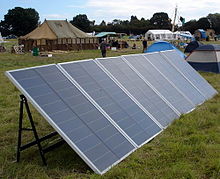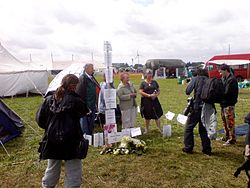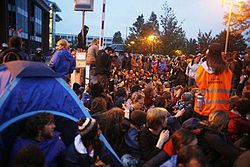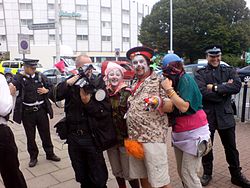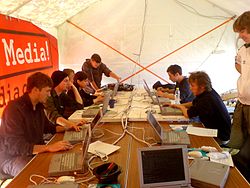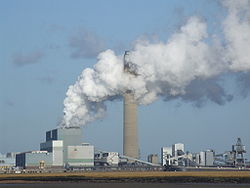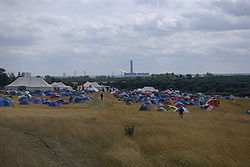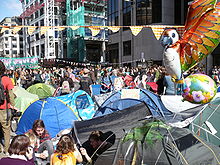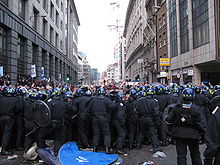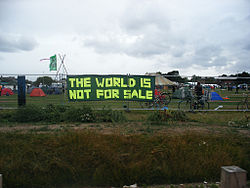- Camp for Climate Action
-
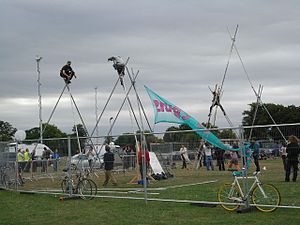 Setting up camp at Blackheath in August 2009
Setting up camp at Blackheath in August 2009
The Camps for Climate Action are campaign gatherings (similar to peace camps) that take place to draw attention to, and act as a base for direct action against, major carbon emitters, as well as to develop ways to create a zero-carbon society. Camps are run on broadly anarchist principles - free to attend, supported by donations and with input from everyone in the community for the day-to-day operation of the camp. Initiated in the UK, camps have taken place in England at Drax power station, Heathrow Airport, Kingsnorth power station in Kent and in the City of London. During 2009 camps have also taken place in Canada, Denmark, France, Ireland, Netherlands/Belgium, Scotland, Wales and Australia.
Contents
General
Camps are organised through the preceding year with a series of monthly meetings, previously held in Manchester, Nottingham, Oxford, Leeds, Bristol, London, and Talamnh (near Glasgow). Anyone is welcome to attend a planning meeting and to join one of the working groups. There were no 'leaders' and meetings used consensus decision making. Camps are run entirely by volunteers and are funded by private donations.
Much of the material used to created structures for the camp is reclaimed waste from building sites which would otherwise have been sent to a landfill. Compost toilets, comprehensive recycling, grey water systems and a pedal-powered laundries.[1] The site of the camp is divided into loosely bounded 'neighbourhoods', most corresponding to geographic region (one exception being the queer neighbourhood of the 2006 camp). Daily consensus-based meetings are held in each neighbourhood, with spokes-people sent to a central meeting. It is considered to be in the nature of the camp that organisational structures are loose and reflexive, so as to be open to change if they are not seen to be effective or efficient.
During the camp there's a lot of training on practical skills (including consensus decision-making) to be able to run such camps, different aspects of taking direct action, as well as a large number of workshops on themes of sustainability and climate-related issues.[2]
Power for lighting, radios, mobile phones, sound equipment and laptop computers was supplied by solar panels and a wind turbine. Biodiesel from recycled cooking oil was available for vehicles. Cooking used conventional propane cylinders.[3] In 2007 a satellite up-link was installed, together with a media tent with ten laptop computers,[4] this was also used to send media to the press as well as Indymedia UK.[5]
In 2008, a new sound system made its first appearance at the Camp for Climate Action. All of the system was made from recycled materials, except its battery. During the stop searches the battery was dropped and damaged yet the sound system still worked throughout the camp. This sound system mainly played reggae/lovers rock and dubstep at Gate 5 throughout the night and during the raids. The sound system was powered by a 12-volt leisure battery, charged using solar power. A car amp was used to power the speakers the system was mono and the amp was bridged. The sound system was built by Onedread and Dec. 'Son of pedals' sound system was another sound system at the Camp for Climate Action Video.
There is a strong emphasis on the use of bicycles and public transport, including a Bicycology tour from London via Lancaster.[6]
As the United Nations has reported that "livestock is a major threat to environment"[7][8] all food is vegan, mostly organic and locally sourced to minimise food miles, provided by communal neighbourhood kitchens, many associated with the Social Centres Network.
List of Camps for Climate Action
Climate camps started in the UK but have now taken place in a number of countries
Action Location Date Drax power station North Yorkshire, England August 2006 Heathrow Airport London, England August 2007 Kooragang Island Newcastle, New South Wales, Australia July 2008[9] Kingsnorth Power station near London, England August 2008 Climate camp in the city London, England April 2009 Coal Caravan Northern England May 2009[10] Mainshill wood Scotland August 2009[11] Ffos-y-Fran mine Wales August 2009[12] Antwerp Bulk Terminal (ABT) coal terminal Antwerp, Belgium August 2009[13] Nantes Airport Nantes, France August 2009[13] West Offaly Power station Shannonbridge, Ireland August 2009[14] Blackheath London 2009 Blackheath, London, England August 2009[15] One of six 'climate action camps' across Canada Edmonton, Canada August 2009[16] Climate Camp Aotearoa (New Zealand) Wellington, Aotearoa (New Zealand) December 2009[17] A camp happened in October 2009 at Helensburgh near Sydney, which is the site of Australia's oldest coal mine.[18]
Drax 2006
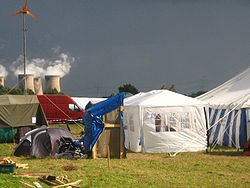 Climate camp with Drax power station in the background
Climate camp with Drax power station in the background
The camp was on a squatted site in Megawatt Valley, situated close to several large power stations including Drax, a coal-fired power station which is the largest single emitter of carbon dioxide in the UK.[19]
Over one hundred and sixty workshops ran throughout the camp, sharing practical skills on living sustainably, on subjects such as the science of climate change, environmental justice and the effects of climate change on people in the global South, corporate 'climate criminals', direct action, children's workshops, and many more.
Music was turned off after 11pm - 'Power Down' - to allow campaigners (with or without families) to sleep. But on the last Monday of the camp music was allowed much later.
Day of action
On 31 August 2006, up to 600 people attended a protest called Reclaim Power converging on Drax and attempting to shut it down. There was a 'kids march' to Drax Power Station, with a giant ostrich puppet, made by The Mischief Makers. Two protesters climbed a lighting pylon at the edge of the Drax site and four others broke through the fence.[20] At least 3,000 police officers, from 12 forces from as far afield as Hampshire and London, were reported to have been drafted in for the duration of the protest. Thirty-eight protesters were arrested. The police reported that work at the power plant was not disrupted, though eye witnesses reported having locked-on to various machinery inside the power station, thus stopping work. No coal went into Drax that day, with the railway line in being blocked off.[21]
Other protests arising from the camp included a protest against a nuclear power station in Hartlepool, Teesside.[22]
Media response
The Guardian reported that the Camp marked a turning point in grass-roots campaigning against the causes of climate change.[23] The network forged at the Camp continues to work on campaigns to highlight and tackle the causes of climate change, participating in actions drawing attention to (for example) road building[24] and the climate effects of cheap air travel.[25] Days of climate action on different themes have been called by this Network for Climate Action.
Heathrow 2007
A 'memorial' to the village of Sipson which would be completely destroyed to make way for a new runway for Heathrow airport
The 2007 camp (51°29′20″N 0°26′43″W / 51.48889°N 0.44528°W) ran from 14 to 21 August 2007 near London Heathrow Airport next to the village of Sipson on a disused sports ground owned by Imperial College London.[26] Sipson would disappear from the map if the third runway at Heathrow was built.[27] It was preceded by 'Our Place' arts weekend, a community arts project run by activists for local residents on 11 & 12 August at St Mary's Church Hall in Harmondsworth, another village which would be severely affected by the building of a third runway.[28]
During the camp there were also protests by Plane Stupid, who were injuncted from protesting at Heathrow. On 13 August Plane Stupid activists boarded a barge transporting an Airbus A380 wing[29] and on the 16th August at London Biggin Hill Airport. 15 protesters chained themselves to its main gates and caused a "long queue of luxury cars waiting to get into the airport to build up".[30]
On the 19th August, the final day of the camp some 1000-1400 people took part in a 'Day of Action' and 200 people blockaded British Airports Authority HQ.[31]
As protesters left on the 20th August protests took place against two carbon offset companies, Climate Care and the Carbon Neutral Company on the 20th August when campaigners dressed as "red herrings" protested at the offices in Oxford London, five people blocked the main gate at Sizewell B nuclear power station in Suffolk, and a group invaded the London offices of Bridgepoint Capital, a private equity firm which is behind the expansion of Leeds-Bradford Airport, and a dozen protesters superglued their hands to entrance doors at BP's headquarters in central London. A total of 58 people were arrested.[31]
Injunction
BAA's proposed injunction would have restricted the movements of 5 million people from 15 different organisations, including the RSPB, Greenpeace, the Campaign for the Protection of Rural England, the Woodland Trust, Friends of the Earth, and the National Trust, among others.[32][33][34] As such the injunction would technically have included the Queen; patron of the RSPB and CPRE, Prince Charles; in his position as President of the National Trust, and even some of BAA's own staff.[35][36] The ruling was sought under the auspices of the Protection from Harassment Act 1997, originally intended to help the victims of stalking,[35] but now frequently used against protesters. In the end BAA won a very much more limited injunction[37] and the camp went ahead amid considerable worldwide publicity.[38] Afterward, Duncan Bonfield, BAA director of corporate affairs, and Mark Mann, BAA head of media relations, resigned without stating their reasons.[39]
Policing
Policing for the camp was estimated to have cost £7 million by Scotland Yard, though this included £4.3m for costs such as salaries which would have been spent anyway.[40] The Evening Standard put the costs at £70 million without explaining how it reached that figure.[34]
In 2007 the police made preventive searches under Section 60 of the Criminal Justice and Public Order Act 1994. The camp was heavily attended by a force of 1,800 police, who carried out searches, including some vehicles, under Section 44 of the Terrorism Act 2006, and took photos of protesters entering and leaving the camp.[41] On Sunday August 19 there were scuffles between protesters and police officers outside the offices of BAA at Heathrow, which were being targeted in a day of direct action by some of the protesters.[42]
Journalistic access
In relation to the 2007 the National Union of Journalists issued a public statement expressing "deep concern" over a proposed draft policy toward media access during its 2007 event.[43] The camp media team replied to the NUJ criticism by stating: "The policy is a compromise that attempts to provide reasonable media access whilst respecting participants' right to privacy".[44] On 9 August 2007 the proposed policy was amended to remove any possibility of blacklisting some journalists or giving sympathetic journalists longer access.[45]
Kingsnorth 2008
The 2008 camp (51°26′23″N -0°32′54″E / 51.43972°N 0.54833°E) took place in Kent, near E.ON UK's Kingsnorth power station, and run from 4 to 11 August to highlight E.ON's plans to build another coal-fired power station, which would be the first to be built in thirty years in the UK.
The action was also to highlight what is seen as an expansion to the fossil fuel economy, by corporations and government, and what activists claim is a demand of the opposite through scientific consensus. Furthermore, the camp attempted to challenge the businesses which will profit from the agrofuel industry, which they see as false solutions to the problems of climate change.[46][47]
The camp began with a one day event at Heathrow, the site of the previous year's camp followed by a march across London to Kingsnorth power station, in common with seven other camps globally that were targeting coal.[46]
Over 200 workshops and debates were held during the camp, including ones with George Monbiot, Caroline Lucas, Arthur Scargill and John McDonnell MP.[48] Arthur Scargill, former General Secretary of the National Union of Mineworkers and Dave Douglass, attended the camp to represent many in the mining community who disagreed with the protesters' anti-coal position which they saw as a continuation of the state's assault against them stemming back to the UK miners' strike (1984–1985). They addressed the campers highlighting the oppressive conditions that miners face all over the world put forth their arguments especially against nuclear power. They also expressed solidarity with the camp against police repression and urged a class perspective.
On Saturday 9 August the protesters attempted to shut down the power station. The day was organised to highlight the impact on climate change with activists marching to Kingsnorth power station. Violent scenes developed between the police and the protesters, with many non-threatening protesters being hit and knocked to the ground by police with batons.[49]
The camp provided facilities that many of the people needed such as showers, cheap food, internet access, entertainment, a TV studio and medical services. Complaints were made about the excessive policing of the event which are now being investigated officially.
On August 11, 2008, several protesters from Oxford and Thames Valley Climate Action glued their hands to the doors of BHP Billiton's headquarters in protest of the use of coal as a fuel. BHP Billiton is the world's largest coal producer. [50]
Policing
1,500 officers were involved at an estimated cost of £5.9m,[51] there were over 100 arrests[52] and some 2000 'potentially harmful' items were confiscated[53] At the time ministers at the time claimed that 70 officers had been injured in the course of their duties.[51] However data obtained under the Freedom of Information Act 2000 in March 2009 showed that no injuries were sustained by the police in clashes with demonstrators and the claim was retracted by Vernon Coaker, the Home Office minister stating that "there were no recorded injuries sustained as a result of direct contact with the protesters".[51] It was also revealed later that amongst the confiscated items were balloons, crayons, and a clown outfit, cycle helmets, plastic buckets, books, life-jackets, inflatable dinghies, paddles and foot pumps.[53]
At the time local MP Bob Marshall-Andrews said that some policing was "provocative and heavy-handed"[54] and Caroline Lucas MEP condemned police tactics, which included riot police, pepper spray and routine stop and search of everyone entering and leaving the camp.[55] In March 2009 the Independent Police Complaints Commission said there was significant public concern at the policing of the camp which should be addressed. These included issues about misconduct, but also in regard to operational tactics including claims that officers used loud music at night to disrupt protesters who were trying to sleep.[56]
Before the camp started police had found weapons hidden in nearby woods which included knives, a replica throwing star and a large chain and padlock. Assistant Chief Constable Gary Beautridge stated that while he believed the majority of the Climate Camp protesters to be peaceful, he was concerned that some had "more sinister intentions". Protesters said the find had nothing to do with the camp and the police agreed that there was no firm evidence linking the them to the camp.[57]
In June, 2009, the Guardian released video evidence of alleged brutality by police officers at the camp against two women. They belonged to the campaign group, Fitwatch, who campaign against the use of forward intelligence teams. They spotted several officers who did not have visible epaulettes and when they asked the officers to reveal their identities they were arrested.[58][59]
Camp in the City 2009
See also: 2009 G-20 London summit protestsThe Camp in the City (51°30′55″N 0°04′57″W / 51.5152°N 0.0825°W) took place on 1 April 2009 was one of a number of protests associated with the G20 London Summit. The aim was to draw attention to carbon trading, claiming that far from being a way of reducing release of climate change gasses in the atmosphere it is used as an excuse to continue doing just that.[60] The camp took place outside the European Climate Exchange in Bishopsgate and was distinct from the G-20 Meltdown protest that took place outside the Bank of England.[61]
Prior to the actual camp a group of participants had played a game called 'capture the flag' in the area on 27 March which was used by the protesters to familiarise themselves with the locale.[62]
Camp for Climate Action organisers agreed to meet with police and exchange contact details shortly before the protest. The meeting was arranged by Liberal Democrat MP David Howarth, who was to mediate at the meeting which was to take place at the House of Commons. Scotland Yard confirmed that a meeting was to take place with Bob Broadhurst (police commander) and Ian Thomas (chief superintendent).[63]
The camp, which was intended to last for 24 hours, started at 12:30pm when a camp was established in a section of Bishopsgate between Threadneedle Street and London Wall with tents set up and bunting across the road reading 'Nature doesn't do bailouts'.[64] There were solar-powered sound systems, musicians and a food stall and some 1,000-plus relaxed people.[65]
The atmosphere was still relaxed at about 5pm when police with helmets, shields and batons began to surround areas of the camp using section 14 of the Public Order Act 1986.[65]
At about 7pm the police stopped allowing people to enter or leave the protest.[66] The police advanced on protesters who put their hands in the air and passively resisted while chanting "This is not a riot"[67] which is a tactic that emerged over the course of a number of Camp for Climate Action gatherings.[68] There were scuffles with the police in which several protesters were hit and kicked by the police and one policewoman needed medical attention.[69] Within the cordon people carried on playing music and preparing food and until the police began letting people leave at about 11:30pm[66] and cleared the area of the last protesters at about 2am.[65]
Jean Lambert MEP of the London Green Party wrote an open letter to the Metropolitan Police Commissioner after the event asking for an explanation of the police tactics.[70]
Blackheath 2009
The camp at Blackheath (51°28′17″N 0°0′14″E / 51.47139°N 0.00389°E) was set up on 26 August on Blackheath Common, which was the site of the 1381 Peasants' Revolt and was due to run until 2 September.[15] The organisers kept the location of the camp secret from the police until the first day of the camp.[71] About 1000 people arrived on the first day with the police adopting a low-key 'community policing' approach[72] and using Twitter for the first time to communicate with protesters[73] and senior officers held five meetings with protesters to prepare for the event.[74] 3000 people were expected to attend the camp.[73] Some 200 workshops were scheduled over the five days on a wide range of environmental, social and climate change issues:[75]
- Activist photography
- Alternatives to money: timebanks and local currencies
- Art not oil: using creativity to resist oil industry sponsorship of the arts
- Butterfly & bee-making with felt
- Citizen journalism
- Carbon trading, Heathrow & Kingsnorth: an intro
- Essential know how: stops, searches and arrests
- Indigenous peoples resistance to our high carbon economy
- Legal observer training
- What students can do about the United Nations Climate Change Conference 2009 in Copenhagen
- Women and the miners' strike
A number of protests at locations around London took place during the camp.[76]
Shops and local pubs reported good business and police presence was keep very low profile and unobtrusive.[77] The Telegraph described it as "the cheapest – and chic-est – date in the summer festival calendar".[78] Climate Camp TV provided a view of the camp and the associated actions.[79]
Ratcliffe-on-Soar 2009
Between 17 and 18 October 2009, protesters from Camp for Climate Action, Climate Rush and Plane Stupid,[80] took part in 'The Great Climate Swoop' at Ratcliffe-on-Soar Power Station. The police arrested 10 people before the protest began on suspicion of conspiracy to cause criminal damage.[81] Some 1,000 people took part, and during the first day groups of up to several hundred people pulled down security fencing at a number of points around the plant.[82] Fifty six arrests were made during the protest and there were a number of injuries, including one policeman who was airlifted to hospital but later discharged.[83]
After the event Julian Baggini, writing in The Times, criticised the protest arguing that climate change did not constitute a justifiable reason for civil disobedience.[84] In response activists said that the urgency of responding to potential extreme climate change did indeed provide sufficient justification.[85]
See also
References
- ^ "Handout for climate camp workshops" (PDF). http://www.climateactionnetwork.org.uk/toolkit/outreach_ideas/materials_for_talks_and_workshops/handout_for_climatecamp_workshop.pdf.
- ^ "Workshops". Camp for Climate Action. Archived from the original on 2007-12-01. http://web.archive.org/web/20071201041543/http://www.climatecamp.org.uk/workshopsoffer.php. Retrieved 2007-12-23.
- ^ Pidd, Helen (2007-08-15). "Rules, rotas and revolutionary song at climate action camp". The Guardian (London). http://www.guardian.co.uk/business/2007/aug/15/theairlineindustry.transportintheuk. Retrieved 2010-03-26.
- ^ Helen Pidd. "A new weather front". The Guardian. Camp for climate action. http://www.climatecalm.org/drupal/index.php?q=node/35.
- ^ Camp for Climate Action 2007 Newswire, Indymedia UK.
- ^ "2006 Bicycology sTOURy". http://www.bicycology.org.uk/events/2006_summer_tour.htm.
- ^ "Livestock a major threat to environment". United Nations Food and Agriculture Organization. 2006-11-20. http://www.fao.org/newsroom/en/news/2006/1000448/index.html.
- ^ Steph Brown. "Fight climate change! Go vegan!". http://www.climatecalm.org/drupal/index.php?q=node/36.
- ^ Australia's Newcastle Coal Price Falls From Record (Update) Jesse Riseborough July 14, 2008 Bloomberg
- ^ "COAL CARAVAN - route & dates update". http://www.earthfirst.org.uk/actionreports/node/21915.
- ^ "Climate Camp Scotland". http://climatecampscotland.org.uk/.
- ^ "http://climatecamp.org.uk/blog/2009/08/22/climate-camp-cymru-ffos-y-fran-mine-action". http://climatecamp.org.uk/blog/2009/08/22/climate-camp-cymru-ffos-y-fran-mine-action.
- ^ a b "News from climate action camps in Scotland, Belgium/Netherlands and France". http://www.earthfirst.org.uk/actionreports/node/22925.
- ^ "Activists to continue protest at ESB power plant". http://www.irishtimes.com/newspaper/ireland/2009/0819/1224252871848.html.
- ^ a b Batty, David (2009-08-26). "Climate Camp hits London". The Guardian. http://www.guardian.co.uk/environment/blog/2009/aug/26/climate-camp-climate-change. Retrieved 2009-08-26.
- ^ "Greenpeace camp for 'climate defenders'". Edmonton Sun. http://www.edmontonsun.com/news/alberta/2009/08/29/10664046-sun.html. Retrieved 2009-08-29.
- ^ http://www.earthfirst.org.uk/actionreports/node/23641
- ^ "Climate Camp 09: Oct 9 – 11. Australia's oldest coal mine, Helensburgh, 40 minutes south of Sydney". http://www.climatecamp.org.au/helensburgh2009. Retrieved 2009-08-29.[dead link]
- ^ "Power station protesters arrested". BBC News. 2006-09-01. http://news.bbc.co.uk/2/hi/uk_news/england/north_yorkshire/5300560.stm. Retrieved 2010-01-02.
- ^ Wainwright, Martin (2006-09-01). "In the shadow of Drax, not so much a fight as a festival". The Guardian (London). http://www.guardian.co.uk/climatechange/story/0,,1862662,00.html. Retrieved 2010-03-26.
- ^ Brown, Jonathan (2006-09-01). "The Battle of Drax: 38 held as protest fails to close plant". The Independent (London). http://news.independent.co.uk/environment/article1223134.ece. Retrieved 2010-04-28.
- ^ Ward, David (2006-08-30). "Energy protesters blockade nuclear power station". The Guardian (London). http://environment.guardian.co.uk/energy/story/0,,1861035,00.html. Retrieved 2010-04-28.
- ^ Green goes mainstream. The Guardian - 1 September 2006
- ^ No Widening M1 Network
- ^ "Plane Stupid". http://www.planestupid.com.
- ^ "Climate Camp at Heathrow". http://www.channel4.com/news/articles/society/environment/climate+camp+at+heathrow/671777.
- ^ Ryan, Margaret (2006-02-21). "Village faces being wiped off map". BBC News Online. http://news.bbc.co.uk/1/hi/uk/4731948.stm. Retrieved 2008-03-04.
- ^ "Event report: Residents, artists unite to celebrate villages threatened by Heathrow". Our Arts. http://ourplace-arts.org.uk.
- ^ "Plane Stupid occupy Airbus A380 wing - BBC News". http://www.planestupid.com/airbus1.
- ^ "Environmental activists arrested at Biggin Hill". http://www.kentnews.co.uk/kent-news/Environmental-activists-arrested-at-Biggin-Hill--newsinkent4654.aspx.
- ^ a b "Campaigners leave Heathrow camp". BBC News. 2008-08-20. http://news.bbc.co.uk/1/hi/uk/6954428.stm. Retrieved 2008-03-05. Including map of proposed third runway
- ^ Brown, Jonathan (2007-08-07). "Joy for protesters as Heathrow is denied 'mother of all injunctions'". London: The Independent. http://www.independent.co.uk/news/uk/crime/joy-for-protesters-as-heathrow-is-denied-mother-of-all-injunctions-460565.html. Retrieved 2008-03-04.
- ^ "BAA wins Heathrow protesters ban". BBC News Online. 2007-08-06. http://news.bbc.co.uk/1/hi/uk/6932519.stm. Retrieved 2008-03-04.
- ^ a b "Anarchists to flood in as new Heathrow T5 opens". 2008-02-19. http://www.thisislondon.co.uk/standard/article-23439495-details/Anarchists+to+flood+in+as+new+Heathrow+T5+opens/article.do. Retrieved 2008-03-04.[dead link]
- ^ a b "BAA wins ban against climate change activists". 2007-08-06. http://www.politics.co.uk/news/opinion-former-index/environment-and-rural-affairs/baa-wins-ban-against-climate-change-activists-$476907.htm. Retrieved 2008-03-04.
- ^ "Aviation industry takes 5 million people to court". 2007-07-26. http://www.greenpeace.org.uk/blog/climate/aviation-industry-takes-the-queen-five-million-brits-and-itself-to-court-20070726. Retrieved 2008-03-05.
- ^ "Heathrow protesters ban". BBC News. 2007-08-06. http://news.bbc.co.uk/1/hi/uk/6932519.stm. Retrieved 2010-01-02.
- ^ "Heathrow protesters set up camp". BBC News. 2007-08-12. http://news.bbc.co.uk/1/hi/uk/6943084.stm. Retrieved 2010-01-02.
- ^ "Two top press officers resign from BAA=Work=Reuters". 2007-08-22. http://uk.reuters.com/article/businessNews/idUKL2231571420070822.
- ^ "Heathrow protest police cost £7m". BBC News. 2007-09-06. http://news.bbc.co.uk/1/hi/england/london/6982705.stm. Retrieved 2008-03-05.
- ^ Jon Kelly (2007-08-13). "Eco-village with a stark warning". BBC News. http://newsvote.bbc.co.uk/1/hi/uk/6944526.stm?dynamic_vote=ON#vote_news_hys_airports_67845.
- ^ "Minor scuffles in airport protest". BBC News. 2007-08-19. http://news.bbc.co.uk/1/hi/uk/6953518.stm. Retrieved 2010-01-02.
- ^ "NUJ warns Climate Camp over restrictions on media". National Union of Journalists. 2007-08-07. http://www.nuj.org.uk/inner.php?docid=1819.
- ^ "Climate camp response to NUJ Criticisms". Indymedia. http://www.indymedia.org.uk/en/2007/08/377840.html.
- ^ "Camp for climate action - Climate camp amended Press Policy, 2007". http://www.climatecamp.org.uk/newpress.php.
- ^ a b "Climate Camp Press Release: Camp to target Kingsnorth". Climate Camp. http://www.climatecamp.org.uk/pr2-3-08.php.
- ^ Climate Camp 2008 to target Kingsnorth power station, Indymedia UK March 4th 2008.
- ^ "Arthur Scargill, Caroline Lucas kick off Climate Camp workshops Mon 4 Aug". http://forums.redpepper.org.uk/index.php?topic=589.0.
- ^ Police at Climate Camp (Documentary). Kingsnorth, England: http://blip.tv/file/1177381. http://blip.tv/file/1177381. Retrieved 2009-04-03.
- ^ “Coal protest team glued to doors
- ^ a b c Vidal, John (2008-12-15). "Those Kingsnorth police injuries in full: six insect bites and a toothache". The Guardian (London). http://www.guardian.co.uk/environment/2008/dec/15/kingsnorth-climate-change-environment-police. Retrieved 2009-04-07.
- ^ Miller, Vikki; Leach, Ben (2008-08-09). "Kent power station protest: Over 50 environmental activists arrested". The Telegraph (London). http://www.telegraph.co.uk/news/2530714/Kent-power-station-protest-Over-50-environmental-activists-arrested.html. Retrieved 2010-03-26.
- ^ a b McVeigh, Tracy (2009-03-01). "Police 'over the top' at climate camp". The Observer (London). http://www.guardian.co.uk/politics/2009/mar/01/kingsnorth-power-station-climate-camp. Retrieved 2010-03-26.
- ^ "Climate camp policing condemned". BBC News. 2008-08-05. http://news.bbc.co.uk/1/hi/england/kent/7544233.stm. Retrieved 2010-01-02.
- ^ Caroline Lucas (2008-08-04). "Dirty tactics to defend a dirty industry". The Guardian (London). http://www.guardian.co.uk/commentisfree/2008/aug/04/kingsnorthclimatecamp.climatechange. Retrieved 2010-03-26.
- ^ "Concern over Climate Camp police". BBC News. 2009-03-27. http://news.bbc.co.uk/1/hi/england/kent/7968884.stm. Retrieved 2009-04-07.
- ^ "'Weapons Stash' near Climate Camp". BBC News. 2008-08-09. http://news.bbc.co.uk/1/hi/england/kent/7542592.stm. Retrieved 2009-04-07.
- ^ Lewis, Paul (2009-06-23). "Surveillance protesters bundled to ground by police". The Guardian (London). http://www.guardian.co.uk/environment/2009/jun/21/kingsnorth-protester-arrests-video-complaint. Retrieved 2009-06-23.
- ^ "Numbers must be on display". Daily Mail (London). 2009-04-17. http://www.dailymail.co.uk/news/article-1170963/Maybe-just-forgot-Scotland-Yards-incredible-excuse-police-officer-spotted-ID-street-protest.html. Retrieved 2009-07-03.
- ^ "Carbon trading". Climate Camp. http://www.climatecamp.org.uk/carbon-trading. Retrieved 2009-04-07.[dead link]
- ^ "Timetable Of Disruption: The Summit Protests". Sky News. http://news.sky.com/skynews/Home/UK-News/G20-Summit-Protests-Guide-To-Whats-Going-To-Happen-And-When/Article/200904115253140?videoSourceID=2fa12d8859160210VgnVCM1000005d04170aRCRD&lpos=UK_News_Article_Inline_Player_List_0&lid=ARTICLE_15253140_G20_Summit_Protests%3A_Guide_To_Whats_Going_To_Happen_And_When. Retrieved 2009-04-07.
- ^ "Eco-activists prepare for protest". BBC News. http://news.bbc.co.uk/1/uk/7961868.stm.[dead link]
- ^ Lewis, Paul (2009-03-30). "Police agree to urgent talks with G20 protesters". The Guardian (London). http://www.guardian.co.uk/world/2009/mar/30/g20-police-agree-talks-protesters. Retrieved 2010-03-26.
- ^ Casciani, Dominic (2009-04-01). "Eyewitness: Climate Camp in the City". BBC news. http://news.bbc.co.uk/1/hi/uk/7977863.stm. Retrieved 2009-04-07.
- ^ a b c "Peace, love and riot police". Sky news. http://blogs.news.sky.com/thedailyplanet/Post:82f1acc3-041a-48d7-a5aa-b8efc8c96522. Retrieved 2009-04-07.
- ^ a b McGrath, Beth (2009-04-02). "G20: The police ruined a peaceful protest". Guardian (London). http://www.guardian.co.uk/commentisfree/libertycentral/2009/apr/02/g20-protest-climate-camp. Retrieved 2009-04-07.
- ^ "Police brutality at Camp for Climate Action in the City of London". Plane Stupid. http://www.planestupid.com/content/police-brutality-camp-climate-action-city-london. Retrieved 2009-04-07.
- ^ "This is not a riot: an effective, nonviolent response to attacks by riot police". Young Anabaptist Radicals. http://young.anabaptistradicals.org/2009/04/03/this-is-not-a-riot-an-effective-nonviolent-response-to-attacks-by-riot-police/. Retrieved 2009-04-08.
- ^ "G20 Climate Camp anger simmers in the kettle". The Guardian (London). 2009-04-02. http://www.guardian.co.uk/environment/blog/2009/apr/02/g20-climate-camp-protest-london-police-bishopsgate. Retrieved 2009-04-07.
- ^ "Formal letter to Metropolitan Police Commissioner Sir Paul Stephenson". http://www.greenparty.org.uk/region/london/news/2009-04-03formal-letter-to-metropolitan-police-commissioner-sir-paul-stephenson.html.
- ^ Scotland Yard 'disappointed' at failing to discover location of Climate Camp Richard Edwards The Daily Telegraph 25 Aug 2009
- ^ Walker, Peter (2009-08-27). "Police adopt low profile as 1,000 Climate Camp activists set up base". The Guardian (London). http://www.guardian.co.uk/environment/2009/aug/27/climate-camp-environment-activists-police. Retrieved 2009-08-29.
- ^ a b "Bobby on the Tweet: British Police Try Twitter". Time. http://www.time.com/time/world/article/0,8599,1918997,00.html. Retrieved 2009-08-20.
- ^ Randerson, James (2009-08-26). "Blackheath revealed as Climate Camp location". The Guardian (London). http://www.guardian.co.uk/environment/2009/aug/26/climate-camp-location. Retrieved 2010-03-26.
- ^ "Workshops Programme". Camp for climate action. http://www.climatecamp.org.uk/actions/london-2009/programme. Retrieved 2009-08-29.
- ^ "Protesters glued to floor of bank". BBC News. 2009-09-01. http://news.bbc.co.uk/1/hi/8231209.stm. Retrieved 2010-01-02.
- ^ "BLACKHEATH: Climate Camp leaves as shops count profits". http://www.newsshopper.co.uk/news/4577371.BLACKHEATH__Climate_Camp_leaves_as_shops_count_profits/.
- ^ West, Ed (2009-08-29). "Climate Camp: Wat Tyler would have felt at home among the 'fluffys' in Blackheath". The Telegraph (London). http://www.telegraph.co.uk/earth/6111519/Climate-Camp-Wat-Tyler-would-have-felt-at-home-among-the-fluffys--in-Blackheath.html. Retrieved 2010-03-26.
- ^ "Climate Camp TV". http://climatecamp.tv/.
- ^ "Hundreds of protesters expected to 'take over' Ratcliffe-on-Soar power station". The is Nottingham. http://www.thisisnottingham.co.uk/news/Hundreds-protesters-expected-Ratcliffe-Soar-power-station/article-1429071-detail/article.html.
- ^ Dwyer, Danielle (2009-10-17). "Ten held ahead of power station protest". The Independent (London). http://www.independent.co.uk/news/uk/home-news/ten-held-ahead-of-power-station-protest-1804590.html. Retrieved 2010-04-28.
- ^ "Climate protest enters second day". BBC News. 2009-10-18. http://news.bbc.co.uk/1/hi/england/nottinghamshire/8312918.stm. Retrieved 2010-01-02.
- ^ "Power station demonstration ends". BBC News. 2009-10-18. http://news.bbc.co.uk/1/hi/england/nottinghamshire/8313295.stm. Retrieved 2010-01-02.
- ^ Baggini, Julian (19 October 2009). "Green guerrillas are following a noble tradition". The Times (London). http://www.timesonline.co.uk/tol/comment/columnists/guest_contributors/article6880056.ece. Retrieved 2010-03-26.
- ^ "We’re doing it ourselves: why Baggini has got it wrong". OneClimate. 19 October 2009. http://www.oneclimate.net/2009/10/19/were-doing-it-ourselves-why-baggini-has-got-it-wrong.
External links
- Camp for Climate Action web-page
- Camp for Climate Action list of local groups
- Announcements list for Camp for Climate Action information
- Network for Climate Action
- Sustainable Community Action wiki's Camp for Climate Action 2007 page
- Ecological direct action reports from the UK & beyond
- HACAN website
- films produced at the visionOntv studio during the Camp for Climate Action
Categories:- Radical environmentalism
- Environmental protests
- Environmental organisations based in the United Kingdom
- Anarchist organisations in the United Kingdom
- Counterculture festivals
Wikimedia Foundation. 2010.

